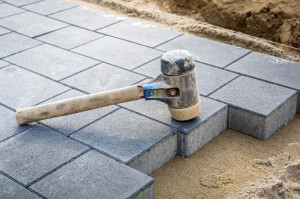 Over the past few years, more and more businesses are turning to concrete pavers for commercial entrances, driveways and parking lots, waiting areas, and other retail and industrial applications. And there is a good reason why. Put simply, pavers provide a wide array of benefits, they are a superior choice for commercial applications. Take your outdoor layout as one example. When seeking to create or update a beautiful outdoor space, the installation of concrete pavers can provide a beautiful and inexpensive paving solution. Interlocking concrete pavers add character while functioning as a durable, low-maintenance, easy-to-install paving option.
Over the past few years, more and more businesses are turning to concrete pavers for commercial entrances, driveways and parking lots, waiting areas, and other retail and industrial applications. And there is a good reason why. Put simply, pavers provide a wide array of benefits, they are a superior choice for commercial applications. Take your outdoor layout as one example. When seeking to create or update a beautiful outdoor space, the installation of concrete pavers can provide a beautiful and inexpensive paving solution. Interlocking concrete pavers add character while functioning as a durable, low-maintenance, easy-to-install paving option.
Even better, concrete pavers for commercial applications come in a plethora of styles, colors, and designs. Even more, they are incredibly durable and long-lasting. They have been used successfully in numerous commercial applications and in all sorts of climates and weather systems. The result? When properly installed, concrete pavers will easily last over 20 years with very little maintenance on your part. Modern high-strength concrete pavers provide resistance to freeze-thaw cycles and heavy friction and high abrasion and skid resistance. Worried about oil and petroleum products? Many concrete pavers are manufactured already resistant to oil-based liquids. They are also very resistant to high temperatures.
Another big advantage of using commercial concrete pagers includes their ease of use. You can remove and replace them quickly and easily. If a paver gets dislodged, it can be re-set very quickly and inexpensively. Pavers are also excellent for reducing stormwater runoff and flooding. Put simply, you cannot find this many compelling reasons to use anything other than concrete commercial pavers!
Concrete Commercial Paver Value Propositions
While concrete pavers may carry a higher sticker price than alternative materials, consider the long-term cost when investing in pavers. After you have taken a closer look at the durability, flexibility, low maintenance, and quick installation of concrete pavers, you will quickly realize that their lower life cycle costs can often prove to be the most cost-effective option for your commercial project.
Pavers withstand shifting earth through the natural use of control joints. While control joints are intentionally added to poured concrete to accommodate the stress of settling and shifting of the earth beneath, the spaces between concrete pavers act as built-in control joints. Unlike full concrete slabs, pavers are less prone to cracking and degradation over time, as a result. Most commercial paving installers improve this durability by using sand-filled joints. These joints act to transfer the load without actually damaging the pavement surface. What’s the result? A longer-lasting, lower-maintenance installation. What’s not to like about that?
What Are Permeable Pavers?
Permeable pavement is a commercial paving option that has been growing in popularity over the past several years, and there’s a good reason for that. It’s superior to asphalt and concrete in terms of durability, cost, installation time, maintenance requirements, and sustainability. Some companies even make 100% recycled plastic pavers, which are one of the most eco-friendly paving materials you’ll find anywhere. If you want to burnish your project’s sustainability cred, then permeable pavers may be just what your company needs.
Permeable pavers are a great option if property prices are high or water restrictions restrain development options. Permeable paver systems offer a functional, space-saving, and safer alternative to traditional water maintenance solutions such as retention ponds. And in some municipalities retention ponds simply are not allowed. Using permeable pavers opens the door to a project that might not have otherwise been possible.
Almost every commercial business in America uses pavement of some sort. Pavement plays a vital role in building the sidewalks, pathways, driving lanes, and parking lots that accompany most buildings. There are many different types of pavement, all with their own strengths and weaknesses. That’s why it is so important for you to conduct proper due diligence on the type of pavers you’ll need for your project.
Concrete pavers are manufactured and installed to easily withstand high volumes of pedestrian and vehicular use. They have been used successfully in numerous residential, commercial, municipal, port and airport applications. So, no matter what your commercial application, you’ll likely find a use for commercial concrete pavers somewhere in your project.
Are you looking for an engineering firm that has worked on countless commercial paving projects? If so, consider your friends at McNeil Engineering. When it comes to commercial roofing and paving jobs, our experts know just what kind of materials your project needs, whether commercial pavers or otherwise. For more information on some of our commercial paving projects, check out the commercial paving section of our website. And once you’re ready for your free consultation, simply contact us. We’re ready to help you take your next commercial building project to the next level.








